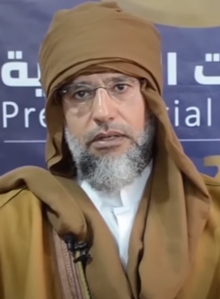Saif al-Islam Gaddafi سيف الإسلام معمر القذافي | |
|---|---|
 Saif al-Islam Gaddafi in November 2021 | |
| Personal details | |
| Born | Saif al-Islam Muammar Gaddafi سيف الإسلام معمر القذافي 25 June 1972 Tripoli, Libyan Arab Republic |
| Political party | Popular Front for the Liberation of Libya |
| Domestic partner(s) | Orly Weinerman (2005–present; estranged) |
| Parents |
|
| Alma mater | Al Fateh University Imadec London School of Economics[2] |
| Profession | Engineer, Diplomat, Painter, Philanthropist, Soldier |
| Website | Gaddafi International Charity and Development Foundation (archived 2017) |
| Military service | |
| Allegiance | |
| Branch/service | Libyan Army Gaddafi loyalists |
| Years of service | 2011 |
| Battles/wars | First Libyan Civil War |
Saif al-Islam Muammar al-Gaddafi (Arabic: سيف الإسلام معمر القذافي; born 25 June 1972) is a Libyan political figure. He is the second son of the late Libyan leader Muammar Gaddafi and his second wife Safia Farkash. He was a part of his father's inner circle, performing public relations and diplomatic roles on his behalf.[3] He publicly turned down his father's offer of the country's second highest post and held no official government position. According to United States Department of State officials in Tripoli, during his father's reign, he was the second most widely recognized person in Libya, being at times the de facto prime minister,[4] and was mentioned as a possible successor, though he rejected this.[5] An arrest warrant was issued for him on 27 June 2011 by the International Criminal Court (ICC) for charges of crimes against humanity against the Libyan people, for killing and persecuting civilians,[6] under Articles 7(1)(a) and 7(1)(h) of the Rome statute.[7] He denied the charges.
Gaddafi was captured in southern Libya by the Zintan militia on 19 November 2011, after the end of the Libyan Civil War, and flown by plane to Zintan. He was sentenced to death on 28 July 2015 by a court in Tripoli for crimes during the civil war, in a widely criticized trial conducted in absentia. He remained in the custody of the de facto independent authorities of Zintan.[8] On 10 June 2017, he was released from prison in Zintan, according to a statement from Abu Bakr al-Siddiq Battalion.[9] Later the same month, his full amnesty was declared by the Tobruk-based government led by Khalifa Haftar.[10] As of December 2019[update], Gaddafi remained wanted[11] under his ICC arrest warrant for crimes against humanity.[7] On 14 November, he attempted to register as a candidate in the 2021 Libyan presidential election,[12] but was rejected.[13] This decision was overturned less than a month later, reinstating him as a presidential candidate.[14][15][16]
- ^ "Gaddafi's son conferred with Hilal-e-Quaid". Business Recorder. 19 May 2006. Retrieved 10 July 2023.
- ^ Thomas, Landon (28 February 2010). "Unknotting Father's Reins in Hope of 'Reinventing' Libya". The New York Times.
- ^ "Inside Gaddafi's inner circle". Al Jazeera. 27 February 2011. Retrieved 20 June 2011.
- ^ McLean, Alan; Shane, Scott; Tse, Archie (28 November 2010). "A Selection From the Cache of Diplomatic Dispatches". The New York Times.
- ^ "The Politics of Blackmail". Newsweek. 13 September 2008. Archived from the original on 19 May 2009. Retrieved 9 August 2008.
- ^ Black, Ian; Smith, David (27 June 2011). "War crimes court issues Gaddafi arrest warrant". The Guardian.
- ^ a b Cite error: The named reference
Saif_arrest_warrantwas invoked but never defined (see the help page). - ^ "Libya trial: Gaddafi son sentenced to death over war crimes". BBC. 28 July 2015. Retrieved 28 July 2015.
- ^ "Saif al-Islam Gaddafi freed from prison in Zintan". Al Jazeera. 11 June 2017.
- ^ Xypolia, Ilia (3 July 2017). "News of Saif al-Islam's release: regional politics fuels rumour mill in Libya". News24. Retrieved 3 July 2017.
- ^ Cite error: The named reference
ICC_Werfalli_1970_report15was invoked but never defined (see the help page). - ^ "Saif al-Islam Gaddafi: Son of Libya ex-ruler runs for president". BBC News. 14 November 2021. Retrieved 14 November 2021.
- ^ "Libyan election authority rejects Gaddafi scion's candidacy for president: Report". WION. 16 November 2021.
- ^ "Libyan court reinstates Saif Gaddafi as presidential candidate". Al Jazeera. 2 December 2021. Retrieved 3 December 2021.
- ^ "سيف الإسلام القذافي "يعود إلى السباق الرئاسي" في ليبيا بقرار قضائي" [Saif al-Islam Gaddafi "returns to the presidential race" in Libya by a judicial decision]. BBC News (in Arabic). 2 December 2021. Retrieved 3 December 2021.
- ^ Helgren, Chris (2 December 2021). "Libya court reinstates Gaddafi presidential bid amid election chaos". Reuters. Retrieved 3 December 2021.